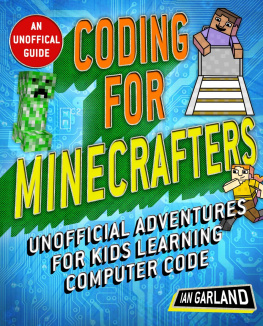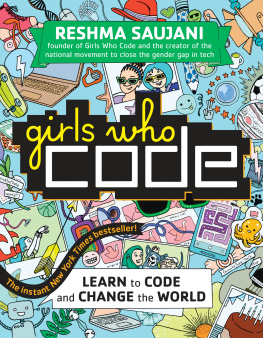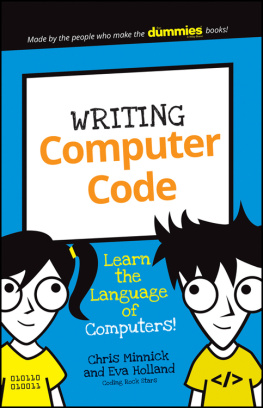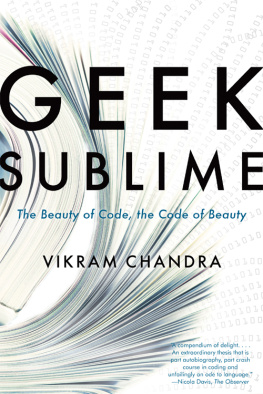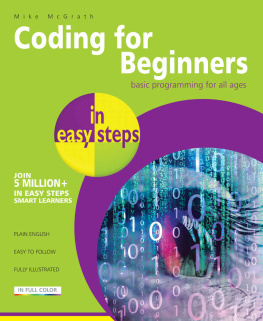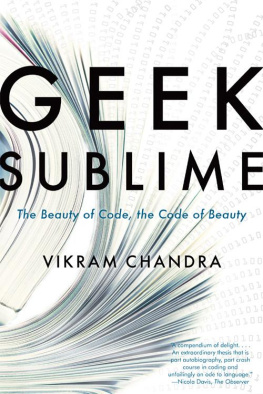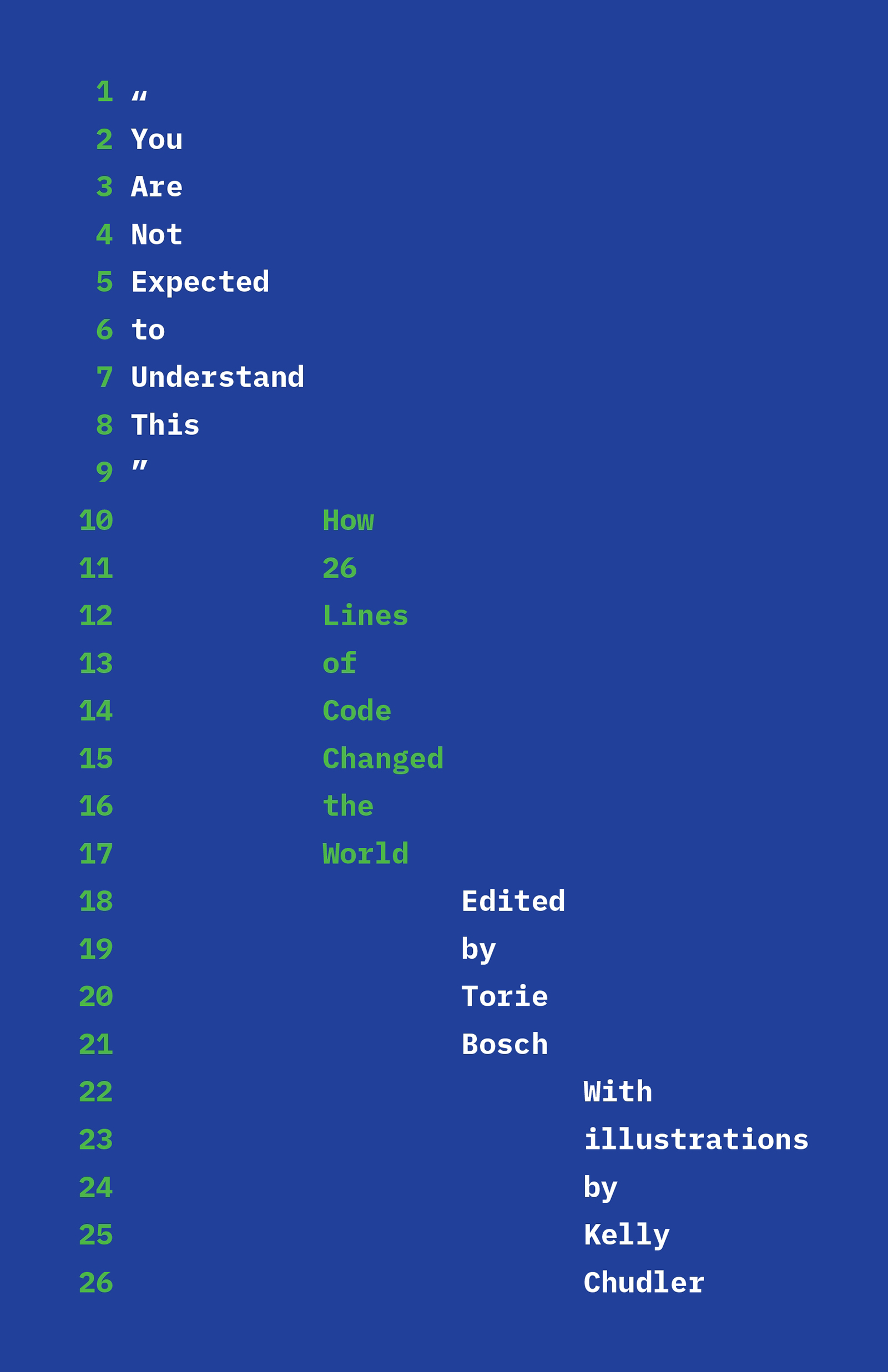Advance Praise forYou Are Not Expected to Understand This
In truth, You Are Not Expected to Understand This is startlingly understandable! These vivid, lucid, brilliant essays tell the origin stories of coding, the secret infrastructure that shapes our online life. We meet the people who wrote and rewrote the lines of code that changed the world. We glimpse their ambitions, mistakes, remorse, fixes, and ingenuity. We understand why (and how) women were the ones who designed early programming languages like COBOL; how pop-up ads came to exist; how the like button blew up news and politics as we knew them. Read this book, and you will never look at your newsfeed the same way again.
LizaMund author of Code Girls: The Untold Story of the American Women Code Breakers of World War II
Code powers much of modern life, yet most of us spend little time thinking about it. This book will change that. Wide-ranging, provocative, and bursting with humanity, You Are Not Expected to Understand This is essential reading on the history and culture of code.
SaraWachter-Boettche author of Technically Wrong: Sexist Apps, Biased Algorithms, and Other Threats of Toxic Tech
Code governs our livesand this book does a delightful job of giving us a glimpse into some of the biggest wins, and most colossal blunders, in software.
CliveThompson, author of Coders: The Making of a New Tribe and the Remaking of the World
You Are Not Expected to Understand This
You Are Not Expected to Understand This
How 26 Lines of Code Changed the World
Edited by Torie Bosch
With an introduction by Ellen Ullman and illustrations by Kelly Chudler
Princeton University Press/Princeton & Oxford
Compilation and preface copyright 2022 by Slate Magazine.
Essays and illustrations copyright 2022 by Princeton University Press.
Princeton University Press is committed to the protection of copyright and the intellectual property our authors entrust to us. Copyright promotes the progress and integrity of knowledge. Thank you for supporting free speech and the global exchange of ideas by purchasing an authorized edition of this book. If you wish to reproduce or distribute any part of it in any form, please obtain permission.
Requests for permission to reproduce material from this work should be sent to
Published by Princeton University Press
41 William Street, Princeton, New Jersey 08540
99 Banbury Road, Oxford OX2 6JX
press.princeton.edu
All Rights Reserved
Library of Congress Cataloging-in-Publication Data
Names: Bosch, Torie, editor. | Chudler, Kelly S., illustrator. | Ullman, Ellen, writer of introduction.
Title: You are not expected to understand this : how 26 lines of code changed the world / edited by Torie Bosch ; with an introduction by Ellen Ullman and illustrations by Kelly Chudler.
Description: First edition. | Princeton : Princeton University Press, [2022] | Includes bibliographical references and index.
Identifiers: LCCN 2022013091 (print) | LCCN 2022013092 (ebook) | ISBN 9780691208480 (pbk. ; acid-free paper) | ISBN 9780691230818 (e-book)
Subjects: LCSH: Computer programmingPopular works. | Computer science Social aspectsPopular works. | BISAC: COMPUTERS / Programming / General | SOCIAL SCIENCE / Technology Studies
Classification: LCC QA76.6 .Y585 2022 (print) | LCC QA76.6 (ebook) | DDC 005.13dc23/eng/20220527
LC record available at https://lccn.loc.gov/2022013091
LC ebook record available at https://lccn.loc.gov/2022013092
Version 1.0
British Library Cataloging-in-Publication Data is available
Editorial: Hallie Stebbins, Kristen Hop, and Kiran Pandey
Production Editorial: Natalie Baan
Text and Cover Design: Chris Ferrante
Production: Danielle Amatucci and Lauren Reese
Publicity: Kate Farquhar-Thomson and Sara Henning-Stout
Copyeditor: Michele Rosen
: Comic adapted from MonkeyUser, reproduced with permission.
Contents
- ix
- Torie Bosch
- EllenUllman
- Elena Botella
- Benjamin Pope
- Claire L.Evans
- Arthur Daemmrich
- Joy Lisi Rankin
- Margaret OMara
- Charlton McIlwain
- Ellen R.Stofan and NickPartridge
- David Cassel
- Katie Hafner
- Susan C.Herring
- Brian McCullough
- Hany Farid
- Lily Hay Newman
- Ethan Zuckerman
- James Grimmelmann
- JohnMacCormick
- Charles Duan
- Lowen Liu
- Quinn DuPont
- Will Oremus
- Josephine Wolff
- Lee Vinsel
- Syeda Gulshan Ferdous Jana
- Mahsa Alimardani and AfsanehRigot
- Meredith Broussard
Preface
Torie Bosch
In high school in the late 90s, I took my first and only coding classa course on C++. I encountered all of the problems that you hear about when it comes to girls and programming: the only girl in the class, I was coming to the subject cold. Though the class technically had no prerequisites, every other student had a working understanding of coding; many of them had learned from their fathers. My teacher was a woman and started out encouraging, but quickly became exasperated with me. From the first assignment, which I believe had to do with a string of numbers, I flailed. I eked out an A in the class, helped by the boys, who would spot problems in my code and tell me how to fix them. But I never really understood what I was doinghow programming worked or what the different languages meant. The teacher largely skipped over that stuff because she assumed we all knew it, and, I assume, she didnt want to hold the rest of the class back for me. Ive always wondered if she was frustrated with me for making women and girls in STEM look bad.
Before going into that C++ class, I had thought of programming as something simple and straightforward: you tell a computer what to do, and it executes. But that class demonstrated, on a small and annoying scale, that telling a computer what to do inherently requires messy human thinking. I learned that code could be wrong yet still somehow work, and that it could have unintended ramificationsramifications that might not matter much when I was working on, say, a birthdate calculator, but would matter a lot if I were working on a transportation system. Thinking about these issues was fascinating; coding was not for me, perhaps, but thinking about it was.
Thats the idea behind this book: that we should all think a little more about code, because code has in infinite ways changed how we live in the world, for better, worse, or somewhere in between. And behind the code, of course, are people: people who make decisions, make mistakes, make assumptions, take brilliant chances, and take shortcuts, with majorand sometimes unintendedramifications. The 26 essays in this book, written by technologists, historians, journalists, academics, and sometimes the coders themselves, tell the stories of people writing code that is by turns brilliant, funny, sloppy, and shortsighted. The essays show us how code worksor how, sometimes, it doesnt workowing in no small way to the people behind it.


